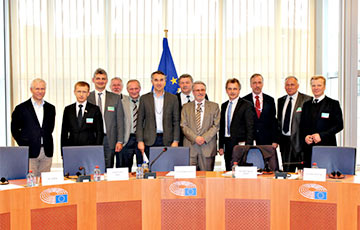Liabedzka: Free Elections Are Only Key To Belarusian Problem
4- 24.05.2016, 15:36
- 5,644

In Brussels opposition leaders have worked out a unified position on “parliamentary elections” in Belarus.
Belarusian opposition leaders are on a working visit in Brussels. Ucpb.org website has interviewed the chairman of the United Civil Party of Belarus Anatol Labedzka.
– What took you to Brussels?
– Last time we could not implement the scheduled programme completely. Terrorist attacks [The blasts on March 22, 2016 are meant – ucpb.org] interrupted us. So we are catching up with what we have missed.
– What have you brought to the capital of the united Europe?
– Leaders of 8 political organisations (Anatol Liabedzka, Mikalai Statkevich, Vitaly Rymasheuski, Siarehi Kaliakin, Iryna Veshtard, Yury Hubarevich, Aliaksei Yanukevich, Uladzimir Niakliaeu) have agreed upon a document, in which we give evaluation of the conditions in which the parliamentary campaign is to be held. It is a common position, clear and understandable.
– Whom have you notified about your position?
– A lively and interested discussion took place in the European Parliament. It is a good signal that 6 deputies from different factions and several dozens of people from the secretariat of parliament’s party groups and deputies. Interest to Belarus is a weakly pulsating process, and any round table, any discussion with clear messages is what should be appreciated.
– What key messages have been sent to you to Europeans?
– The organisers have given an opportunity for tree politicians to speak. I was entitled to speak for right centrists. Our voice is in favour of a broader coalition for fair elections, which is to include not only champions of changes from Belarus, but also representatives of international organisations. Fair, free elections are the only key to Belarusian problem.
We are in favour of a conditional dialogue with the authorities. Its formula is: elections under the USCE standards in the morning, and then loans in the evening!
– Have you had meetings with representatives of the EU executive structures?
– Yes, but these meetings were held behind the closed doors.
The text of the document:
The Unified Position of the Democratic Forces on Conditions of Holding the “Parliamentary Campaign” In Belarus.
The authorities have to demonstrate a desire to take into consideration the ODIHR/OSCE recommendations. The changed tactics of the authorities – from statements about “perfect and democratic nature” of the electoral process in Belarus and complete disregard to the ODIHR/OSCE recommendations to demonstration of allegedly good will and words about possible changes are a step forward.
However the real moves and promised changes contradict the spirit and letter of the recommendations of the international community and the democratic community of Belarus.
The major and most obvious problem of the electoral process in Belarus is non-transparent vote count. In the context of Belarus transparency of a vote count could be guaranteed only by:
– Including on a priority basis representatives of political parties and all candidates in precinct electoral commissions, and higher commissions with equal rights for all;
– Public announcing a choice in any ballot paper separately;
– A real opportunity for monitors, international and national alike, to observe all aspects of the electoral process throughout all its duration, including voting, tabulation of votes and vote counting.
A promised “openness” on the one side of the table, where tabulation of votes is held, is not a solution to the problem.
The next generally recognized problem of the elections is manipulations with voters’ lists by the authorities. There is no reason why a national public register of voters with division into constituencies could not be created, made available on the Internet, and lists of voters not to be provided for each constituency until the voting is completely finished. Observers should have a right to examine voter lists and receive an authorized copy of the results protocol.
The third most obvious drawback of the electoral process in Belarus is an excessive use of the early voting procedure, which should be limited and have an exclusive character, only after a written request.
The abovementioned moves are just the most necessary and urgent measures, which should guarantee transparency, fairness and a democratic nature of elections in Belarus. They could be adopted through appropriate instructions from the CEC in the next few days. Bringing the entire electoral legislation of Belarus in line with international democratic norms should be done with wide public participation of the ODIHR/OSCE, the Venetian Commission of the Council of Europe, and also and firstly of all democratic political parties and NGOs within the next 12 months.
There is a risk that after rejecting a proposal of the ODIHR/OSCE and making no real moves towards democratization and increasing transparency of the election process, the authorities could appoint as the “chamber of representatives” deputies citizens whom they would try to present as opposition representatives. Such an approach is absolutely unacceptable for us, it is going just to preserve the situation of absence of real elections in Belarus.









